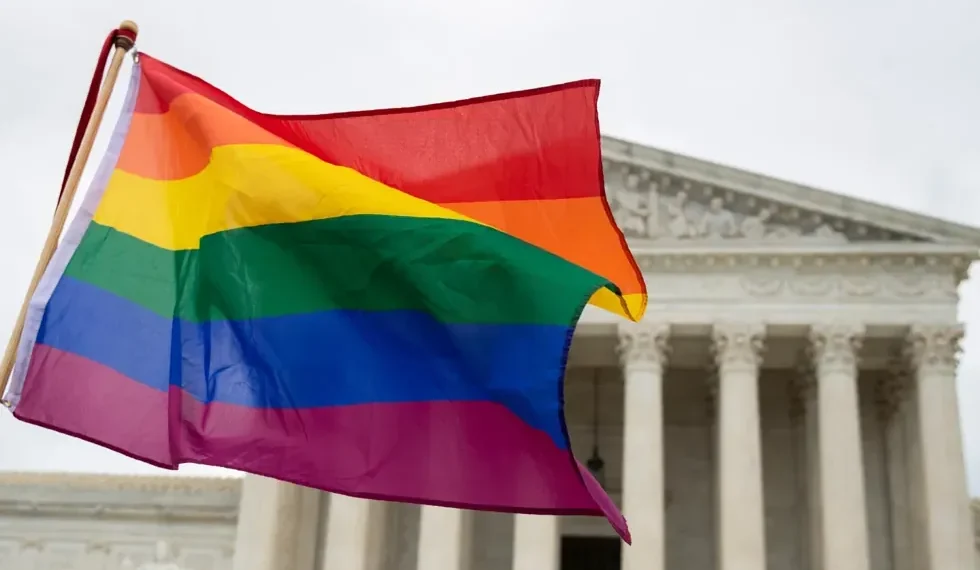WASHINGTON — The U.S. Supreme Court on Monday declined to revisit its landmark 2015 decision that legalized same-sex marriage across the nation, rejecting an appeal from Kim Davis, the former Kentucky county clerk who gained national attention for refusing to issue marriage licenses to same-sex couples.
The justices, without comment, turned away Davis’s petition, effectively upholding a lower-court ruling that ordered her to pay $360,000 in damages and attorney’s fees to two couples who were denied marriage licenses following the Supreme Court’s decision in Obergefell v. Hodges.
Background on the Case
Davis, who cited her religious beliefs in refusing to issue the licenses, argued that her constitutional rights were violated when she was required to comply with the high court’s ruling. Her legal team also sought to challenge the validity of Obergefell, invoking past comments from Justice Clarence Thomas, who has previously questioned the precedent’s legitimacy.
Justice Thomas, joined by three other dissenters in the 2015 decision—Chief Justice John Roberts, Justice Samuel Alito, and the late Justice Antonin Scalia—has repeatedly expressed skepticism about the ruling’s constitutional foundation. However, only Thomas and Alito remain on the Court today.
Judicial Context and Ideological Divides
While Thomas has called for revisiting the issue, other conservative justices have been more reserved. Chief Justice Roberts has not publicly revisited his dissenting stance since 2015, and Justice Alito, though critical of the decision, has recently clarified that he is not advocating for its reversal.
Justice Amy Coney Barrett, who joined the Court in 2020, has previously stated that the Court should correct past mistakes when appropriate. Yet she has also acknowledged that Obergefell may stand apart from other contentious rulings, such as the 2022 decision overturning Roe v. Wade, because millions of couples have built their lives based on the legal recognition of same-sex marriage.
Reaction from LGBTQ+ Advocates
Human rights advocates welcomed the Supreme Court’s refusal to revisit the 2015 precedent. Kelley Robinson, president of the Human Rights Campaign, called the move a victory for equality and accountability.
“The Supreme Court made clear today that refusing to respect the constitutional rights of others does not come without consequences,” Robinson said in a statement.
Her comments reflect broader sentiment among LGBTQ+ rights groups, which view the Court’s inaction as a sign of stability in an area of law that has faced growing political scrutiny since the end of federal abortion protections.
Kim Davis and Her Legacy in Kentucky
Kim Davis first drew national attention in 2015 as the clerk of Rowan County, Kentucky, when she refused to issue marriage licenses to same-sex couples following the Obergefell ruling. Her defiance led to a contempt of court citation and brief imprisonment after she ignored a federal judge’s order to comply.
Davis was released from jail after her office began issuing licenses without her name, a compromise later codified by the Kentucky legislature, which removed all county clerks’ names from state marriage licenses.
Despite her notoriety, Davis’s actions cost her politically—she lost her bid for reelection in 2018.
Legal and Cultural Significance
The Court’s decision to reject Davis’s appeal reinforces the enduring authority of Obergefell v. Hodges as a constitutional guarantee of marriage equality. While the ruling does not preclude future legal challenges, it signals the justices’ reluctance to reopen one of the most consequential civil rights cases of the 21st century.
The debate over same-sex marriage continues to intersect with broader questions of religious freedom and civil rights in the United States. Advocates on both sides have watched closely as the Court’s composition shifted in recent years, raising questions about the stability of major social precedents.
However, Monday’s outcome suggests that even within a more conservative Court, there is limited appetite to overturn a ruling that has become deeply embedded in American legal and social life.
Broader Implications
The decision arrives amid ongoing political debates over LGBTQ+ rights, including state-level challenges to nondiscrimination protections and gender identity policies. Legal scholars note that while the Court’s refusal to hear Davis’s case does not expand marriage rights, it underscores the resilience of established precedent.
For many couples, Obergefell remains more than a legal victory—it symbolizes the culmination of decades of advocacy for equal treatment under the law. The Court’s latest action affirms that, for now, the foundation of that progress remains intact.
This article was rewritten by JournosNews.com based on verified reporting from trusted sources. The content has been independently reviewed, fact-checked, and edited for accuracy, neutrality, tone, and global readability in accordance with Google News and AdSense standards.
All opinions, quotes, or statements from contributors, experts, or sourced organizations do not necessarily reflect the views of JournosNews.com. JournosNews.com maintains full editorial independence from any external funders, sponsors, or organizations.
Stay informed with JournosNews.com — your trusted source for verified global reporting and in-depth analysis. Follow us on Google News, BlueSky, and X for real-time updates.














